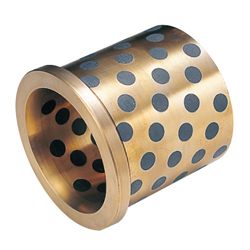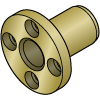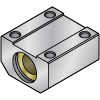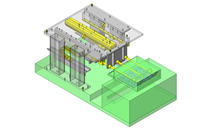(!) Since support from Microsoft will end on January 14th, 2020, Windows 7 will be excluded from the recommended environment from December 15th, 2019 on this site. Vì lý do Microsoft kết thúc hỗ trợ cho Windows 7 vào ngày 14/01/2020, Windows 7 sẽ là hệ điều hành không được khuyến khích sử dụng với trang web này từ ngày 15/12/2019.
Search by Category / Brand Tìm theo danh mục, nhãn hiệu
Search by Category Tìm theo danh mục
- Thể lệ và Giải thưởng cuộc thi "Thiết kế máy Tự động hóa 2025" do MISUMI Việt Nam tổ chức. Xem chi tiết.
- [Thông báo] Cập nhật địa chỉ kho tập kết hàng hóa tại khu vực miền Nam của MISUMI Việt Nam. Xem chi tiết.
[Announcement] Update on warehouse address in the Southern region of MISUIMI Vietnam. See more.
Oil Free Bushings(Mounting Shaft Fits:m6)
|
Type
|
|
|---|---|
Brand |
|
| CAD |
|
| Days to Ship |
|
1 itemsMặt hàng
- Sort By
-
You can add up to 6 items per a category to the compare list.

#500SP1 SL1 Flange Guide Bushing (SGF)
OILES
Suitable for rotation, swing and reciprocating motions. Tightening with hexagon socket set screws, etc., is recommended for use.
- CAD :
- 2D
Type Inner Dia. d(Ø) Outer Dia. D(Ø) Overall Length L(mm) Metal Type Environment Resin Type Multi-layer Case Shape Mounting Shaft Fits Mounting Hole Fits Lubrication Thickness t(mm) Max. Allowable Surface Pressure P(N/mm2) Case Material Max. Allowable Velocity V(m/s) Length Type Max. Allowable PV Value Range(N/mm2•m/s) Max. Allowable PV Value(N/mm2•m/s) Flanged Type 40 55 70 Brass Standard / In Chemical - - - m6 - Unlubricated / Regular Lubrication - 29 - 0.5 - 1.1~2.0 1.65 From: 1,714,031 VND Days to Ship: Số ngày giao hàng: 7 Day(s) or more  7 Day(s) or more
7 Day(s) or more
| BrandNhãn hiệu |
|---|
| Product SeriesDòng sản phẩm |
| CADCAD |
| From |
| Days to ShipSố ngày giao hàng |
| Type |
| Inner Dia. d(Ø) |
| Outer Dia. D(Ø) |
| Overall Length L(mm) |
| Metal Type |
| Environment |
| Resin Type |
| Multi-layer |
| Case Shape |
| Mounting Shaft Fits |
| Mounting Hole Fits |
| Lubrication |
| Thickness t(mm) |
| Max. Allowable Surface Pressure P(N/mm2) |
| Case Material |
| Max. Allowable Velocity V(m/s) |
| Length Type |
| Max. Allowable PV Value Range(N/mm2•m/s) |
| Max. Allowable PV Value(N/mm2•m/s) |
You can add up to 6 items per a category to the compare list. | |
| BrandNhãn hiệu | OILES |
| Product SeriesDòng sản phẩm | |
| CADCAD |
|
| From | 1,714,031 VND |
| Days to ShipSố ngày giao hàng | 7 Day(s) or more |
| Type | Flanged Type |
| Inner Dia. d(Ø) | 40 |
| Outer Dia. D(Ø) | 55 |
| Overall Length L(mm) | 70 |
| Metal Type | Brass |
| Environment | Standard / In Chemical |
| Resin Type | - |
| Multi-layer | - |
| Case Shape | - |
| Mounting Shaft Fits | m6 |
| Mounting Hole Fits | - |
| Lubrication | Unlubricated / Regular Lubrication |
| Thickness t(mm) | - |
| Max. Allowable Surface Pressure P(N/mm2) | 29 |
| Case Material | - |
| Max. Allowable Velocity V(m/s) | 0.5 |
| Length Type | - |
| Max. Allowable PV Value Range(N/mm2•m/s) | 1.1~2.0 |
| Max. Allowable PV Value(N/mm2•m/s) | 1.65 |
Loading...Tải…
ConfigureTạo
Specification/DimensionsĐặc điểm kỹ thuật / Kích thướcĐặc điểm kỹ thuật / Kích thước
-
Inner Dia. d(Ø)
-
Outer Dia. D(Ø)
- 3
- 3.5
- 4
- 4.5
- 4.6
- 5
- 05
- 5.5
- 5.6
- 06
- 6
- 7
- 08
- 8
- 9
- 10
- 11
- 12
- 12$8$12$8
- 13
- 14
- 15
- 16
- 17
- 18
- 19
- 20
- 21
- 22
- 23
- 24
- 25
- 26
- 27
- 28
- 29
- 30
- 31
- 32
- 33
- 34
- 35
- 36
- 37
- 38
- 39
- 40
- 42
- 43.0
- 44
- 45
- 47
- 48
- 50
- 52
- 53.0
- 55
- 56
- 57
- 60
- 62
- 65
- 68
- 70
- 74
- 75
- 78
- 80
- 85
- 90
- 95
- 96
- 100
- 105
- 110
- 115
- 117
- 118
- 120
- 125
- 130
- 135
- 140
- 145
- 150
- 155
- 156
- 160
- 165
- 170
- 180
- 190
-
Overall Length L(mm)
- 2
- 02
- 2.4
- 2.5
- 2.6
- 2.7
- 2.8
- 3
- 03
- 3.5
- 3.8
- 4
- 04
- 4.4
- 4.5
- 4.8
- 05
- 5
- 5.5
- 5.9
- 06
- 6
- 6.5
- 7
- 7.5
- 7.7
- 08
- 8
- 9
- 9.5
- 10
- 10.5
- 11
- 11.5
- 12
- 12.5
- 13
- 13.5
- 13.8
- 14
- 15
- 15.5
- 16
- 16.5
- 17
- 17.5
- 18
- 19
- 20
- 21
- 21.5
- 22
- 23
- 24
- 25
- 26
- 27
- 28
- 29
- 30
- 31.5
- 32
- 34
- 35
- 36
- 37
- 38
- 39
- 40
- 42
- 42.5
- 45
- 47
- 48
- 50
- 51
- 52
- 55
- 56
- 57
- 58
- 59
- 60
- 62
- 63
- 64
- 65
- 67
- 67.5
- 68
- 69
- 70
- 73
- 74
- 75
- 77
- 78
- 80
- 81
- 82
- 85
- 86
- 90
- 95
- 97
- 100
- 103
- 108
- 110
- 112
- 115
- 120
- 125
- 128
- 130
- 140
- 141
- 150
- 158
- 170
- 180
- 188
- 500
-
Metal Type
- Bronze
- Brass
- Cast Iron
- Sintered Steel
-
Environment
- Standard
- Heat Resistant
- Foreign Object Resistant
- Vibration Resistant
- In Oil
- In Water
- In Seawater
- In Chemical
- Conformance to Food Sanitation Law
-
Resin Type
- POM (Polyacetal)
- PTFE (Polytetrafluoroethylene)
- High Performance Polymer Composition
- Polyphenylenesulfide
-
Multi-layer
- Steel, Sintered Bronze, Polytetrafluoroethylene
- Steel, Sintered Bronze, Polyacetal
- Steel, Copper Type Sintered Alloy
- Metal Mesh, Polytetrafluoroethylene
- Aluminum, Fluororesin
- Polyacetal
-
Case Shape
-
Mounting Shaft Fits
-
Mounting Hole Fits
-
Lubrication
-
Thickness t(mm)
-
Max. Allowable Surface Pressure P(N/mm2)
-
Case Material
-
Max. Allowable Velocity V(m/s)
-
Length Type
-
Max. Allowable PV Value Range(N/mm2•m/s)
-
Max. Allowable PV Value(N/mm2•m/s)
Related Categories to Oil Free BushingsDanh mục liên quan đến Oil Free Bushings
FAQ Oil Free Bushings
- Question: What does the term ″self-lubricating bushing″ refer to?
- Answer: The term ″self-lubricating bushing″ refers to a type of bearing or sleeve that has the ability to provide lubrication to reduce friction without requiring external lubricants like oil or grease. These bushings are designed with embedded solid lubricants, such as graphite or PTFE (Teflon), which release lubrication during operation. They are commonly used in various applications where low friction, smooth operation, and maintenance-free performance are desired, such as in machinery, automotive components, and industrial equipment.
- Question: Should you apply grease or oil to bronze bushings?
- Answer: In general, bronze bushings do not need additional grease or oil. They are self-lubricating and don't require external lubrication. However, if there is excessive friction or wear, a small amount of compatible oil or grease can be applied. It's best to follow the manufacturer's recommendations or seek professional advice for specific bronze bushings.
- Question: What materials are typically used to manufacture self-lubricating bushings?
- Answer: Self-lubricating bushings are usually made from materials like bronze, brass, steel, PTFE (Teflon), nylon, and composites. These materials have built-in lubrication properties, reducing the need for external lubricants. Bronze and brass are durable choices, steel is strong, PTFE offers low friction, nylon is lightweight, and composites provide a balance of strength and self-lubrication. Material selection depends on specific application requirements.
- Question: Are bronze bushing self-lubricating?
- Answer: Yes, bronze bushings are self-lubricating. They contain built-in solid lubricants like graphite or PTFE. This means they can provide lubrication on their own, reducing friction and wear. They don't require additional external lubrication, making them convenient and suitable for various applications.





























How can we improve?
How can we improve?
While we are not able to respond directly to comments submitted in this form, the information will be reviewed for future improvement.
Customer Privacy Policy
Thank you for your cooperation.
While we are not able to respond directly to comments submitted in this form, the information will be reviewed for future improvement.
Please use the inquiry form.
Customer Privacy Policy